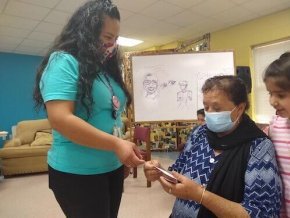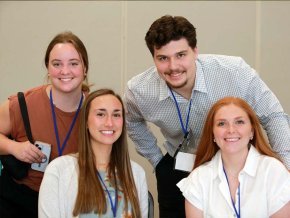Public Health, B.S.
Make an impact on public health through the power of prevention.
Public health is the applied science of protecting and promoting the health and wellness of individuals, families and populations using evidence-based health promotion and disease prevention programs and policies. The field of public health is charged with assessing, understanding, and responding to the behavioral and ecological factors that influence the health of communities.
Public health challenges you to consider the biological, environmental, and social determinants of health. Within the interdisciplinary curriculum, you’ll explore health behaviors and policies through courses in personal health, global health, nutrition, psychology, biology, communication, research methods and health promotion programming. Majors address contemporary health issues and the factors that influence them, including advocacy and equity.
Request Information
Take the next step toward completing your B.S. in Public Health degree at Lenoir-Rhyne University.
Get StartedTake the next step toward completing your Bachelor of Science in Public Health degree at Lenoir-Rhyne University.
The public health major is interdisciplinary by nature: it covers the general biological, historical, economic and sociological contexts of health as well as important specific health issues such as nutrition, women's health, aging, disease prevention and substance abuse.
You will be challenged to consider the biological, environmental, social and cultural determinants of health and to investigate, research and develop prevention strategies to address community health risks.
Coursework
Coursework includes classes in global health and ethics, health promotion program and management, medical terminology, first aid emergency care and teaching. You also have the opportunity to choose from electives focusing on society and human behavior.
Courses cover the general biological, historical, economic and sociological contexts of health, as well as specific health issues. Coursework includes classes in global health and ethics, health promotion program and management, medical terminology, first aid emergency care and teaching. You also have the opportunity to choose from electives focusing on society and human behavior.

LR has been a huge help with my academics and finances. The eagerness within those who lend a helping hand to keep me on track is something I will not forget and is something I am forever grateful.
Make a Difference in the Lives of Others
-
Influence Healthier Communities
Given the current global health crisis, community health is more important than ever. As a community health professional, you will help maintain the well-being of the population. You will educate your community to stop the spread of viruses like COVID-19, and teach others to prevent diseases such as diabetes, cancer and heart disease. You will help to better the quality of life for many.
Public health professionals also impact government policies and strive to make sure all people have equal access to programs that help them live longer, healthier lives.
-
Graduate School & Career Opportunities
Public health graduates may continue on in graduate studies in public health, healthcare, health education and wellness, or allied health.
Or you can move directly into a professional field in both the public and private sectors as an outreach specialist, program coordinator/manager/assistant, public health educator, community health advocate, violence prevention specialist, worksite wellness specialist, health equity/social justice advocate, health education and communication specialist, wellness program manager, or health administrator.
-
Outside the Classroom
You will have many opportunities to integrate classroom theory with practical real world experiences. An extensive practicum is required for graduation which allows students to work with and learn from professionals in the field. Students gain invaluable experience working with public health agencies including (but not limited to) Greater Hickory Cooperative Christian Ministry, Caldwell County Health Department, Catawba Valley Medical Center, AIDS Leadership Foothills-Area Alliance (ALFA) and LR’s Solmaz Institute.
-
Phi Epsilon Kappa Honorary Society
As a high achieving student, you may apply to become members of Phi Epsilon Kappa (PEK) Honorary Society and participate in service learning on and off campus.
Accelerated Master's Degrees & Tuition Discounts
If you qualify and want to complete a master's degree in public health, you have an excellent opportunity at LR. Through our Accelerated Master's Degrees and Alumni Advantage programs, qualified students may begin graduate work in their senior year, providing the opportunity for faster completion of two degrees. In addition, graduate tuition for LR alumni can be discounted. Refer to each program for additional details.
Admission & Financial Aid
-
Undergraduate AdmissionOur admission team is here to assist you in making the college search process as easy as possible. Our counselors are happy to provide the information and guidance you need to submit your application, apply for financial aid and scholarships, visit and tour our campus.
-
Financial AidWe recognize that paying for college is a top concern for students and their families. Our financial aid staff is here to provide you with financial aid options and assistance to help you achieve your educational goals.
Major Requirements
Public Health is the applied science of protecting and promoting the health and wellness of individuals, families, and populations using evidence-based health promotion and disease prevention programs and policies. The field of public health is charged with assessing, understanding, and responding to the behavioral and ecological factors that influence the health of communities.
Public Health challenges individuals to consider the biological, environmental, and social determinants of health. Within the interdisciplinary curriculum, students will explore health behaviors and policies through courses in personal health, global health, nutrition, psychology, biology, communication, research methods, and health promotion programming. Majors address contemporary health issues and the factors that influence them, including advocacy and equity.
BS in Public Health requires completion of a second major or minor.
-
Major Requirements (42 hours)
Required courses in the major:
- MAT 116 - Introduction to Statistics
- HCS 250G - Multicultural Perspectives
- BIO 281 - Human Anatomy and Physiology I
- HES 287 - Personal Health
- HES 325 - Community Health
- HES 335 - Communicating and Advocating for Health
- HES 385 - Research in Health Exercise and Sport Science
- HES 425 - Health Promotion Programming and Evaluation
- HES 452G - Global Health & Ethics
Major ElectivesChoose 3 electives from those listed below (9 hours):
Minor or Second Major is RequiredThe BS in Public Health requires completion of a second major or a minor.
-
General Elective Credits
General Electives (37 hours) as needed to reach 120 hours overall. The minor or second major hours will count as general electives.
-
Total Credit Hours - Minimum 120 hours
On occasion, technical and/or program requirements may also meet specific General Education requirements. Please confer with your program advisor to determine which courses, if any, may be counted accordingly.
All bachelor's degree programs at Lenoir-Rhyne require at least 120 credit hours. If, in combination, General Education, technical, and program requirements do not generate at least 120 hours, additional credits must be completed to achieve 120 hours. These classes may be general electives, or a student may complete a minor or additional major.
-
General Education Requirements (37 hours)
Graduation Requirements (4 hours)
General Education Requirements
News & Events

LR faculty and students participate in a national program offered by Interfaith Youth core to address vaccine hesitancy and help improve access to vaccination for underserved communities.
View More
Lenoir-Rhyne University students showcased their academic excellence and research expertise at the 2025 North Carolina Academy of Science (NCAS) annual meeting in late March.
View More